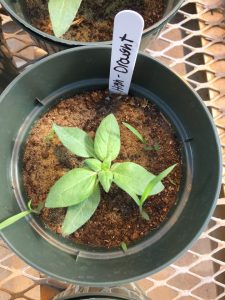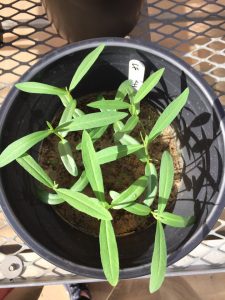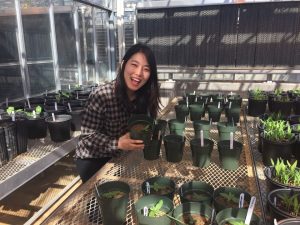Sustainable Food Growth: a Q&A with Seongeun Lee and Dr. Butler
To celebrate Earth Day, World Learning interviewed Global UGRAD student Seongeun Lee and her professor Dr. David M. Butler regarding their experiences in the Organic and Sustainable Crop Production course at The University of Tennessee Knoxville (UTK). Seongeun is from South Korea studying Plant Biotechnology and Political Science, and Dr. Butler is an Associate Professor in the Department of Plants.
Q: What are you currently studying?
Seongeun: Greetings from the University of Tennessee Knoxville. I am studying Plant Biotechnology and Political Science. I really enjoy studying new and different things during my classes, and I want to share one class activity we did in my favorite classes, which is Organic and Sustainable Crop Production.
Q: Why are you studying sustainable crop production?


Seongeun: Modern society is becoming fast and convenient, and as a result, people are seeking things that are fast and convenient in their daily lives. Likewise, the method of agriculture is also changing in the way of convenience, without any concern of preserving a healthy ecosystem. Because of that, I wanted to take this course to gain knowledge in how to grow plants without causing environmental pollution. Moreover, one day, I want to become a food aid worker in a third world country.
Q: What do you hope to learn from this class?
Seongeun: I will use the organic and sustainable farming methods I learned in class by saving the health of the soil. I firmly believe that the conventional agricultural system ruins soil by using chemical compost and pesticides. Additionally, I predict this conventional agricultural system will most likely harm humans’ health and our ecosystem in the near future. I believe soil health has a direct effect on producing healthy food, and this healthy food has a direct effect on the health of humans. Thus, it is a significant task for us to protect our future generations.
Q: What are you currently working on?

Seongeun: What I am now working on is observing crop response to soil type and organic matter. In this lab activity, we amended a field soil with three different levels of compost and evaluated the impact on crop performance and root development under two different irrigation regimes. Each plant is on different soil with different water conditions, which presents different results. I could verify which condition is appropriate for the plant. Moreover, I could clarify that organic matter in the soil has an important role in soil properties, which helps the development of the plant. Before doing this experiment, I only had theoretical expectations. However, after doing the experiment, I could get a better understanding by seeing with my own eyes.
Q: What have you learned from your Global UGRAD education?
Seongeun: Unlike my home university classes in Korea, this class offers a lot of laboratory activities to students, and I really enjoy it. Sadly, I did not have enough chances to do experiments in my home university, because there were a lot of students in one class, making it difficult to manage lab activities. However, my Organic and Sustainable Crop Production class at UTK consists of multiple textbooks and four laboratory activities. I could not have known how to apply this knowledge to the real world without seeing it with my own eyes during the activity. Thus, I am very appreciative that I have had a meaningful experience during this class at UTK.
Q: How has your experience been with teaching a Global UGRAD student?
Professor David M. Butler: Ms. Lee has been a pleasure to have in class as a Global UGRAD. My course in organic crop production has a limited number of international students (a visiting Fulbright exchange student in addition to Ms. Lee), but the perspectives that international students bring to the classroom are invaluable, especially for courses that deal with issues having global application and implications like crop production. At the same time, as an instructor it can be challenging to ensure that course materials are presented in a way that is accessible for international students, who may not be as familiar with teaching methodologies in U.S. universities or have academic backgrounds that differ from current students. I hope that I have risen to this challenge and would absolutely love to see more Global UGRADs and other international students in my courses in the future!
Written by Seongeun Lee (South Korea) a 2017-2018 Global UGRAD student at University of Tennessee Knoxville